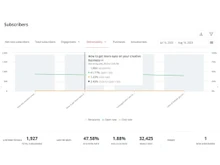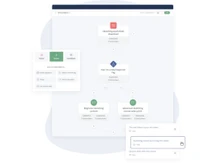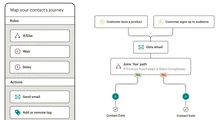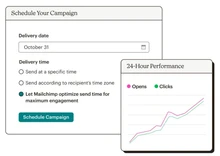For any company that wishes to establish a lasting relationship with its clients, email marketing software is an essential tool. By simply clicking a button, they make it simple to create and distribute visually appealing emails to many recipients.
There are multiple email marketing tools available. However, here, we will evaluate MailChimp and ConvertKit according to important criteria such as features, user interface, pricing, performance, customer support, etc.
Mailchimp vs. ConvertKit: An Overview
Mailchimp is a popular email marketing platform that provides a range of tools and features for creating, sending, and tracking email campaigns. It offers a free plan for small lists, as well as paid plans with additional features and support for larger lists. Mailchimp further provides integrations with other apps and services, such as social media and e-commerce platforms.
ConvertKit is also a well-known email marketing software designed for creators, entrepreneurs, and small businesses. It offers a range of features such as automated workflows, landing pages, and analytics to help users grow their email lists and engage with subscribers. With ConvertKit, users can create and send newsletters, set automated sequences, and track their email performance.
Mailchimp vs. ConvertKit: Pros and Cons
Here are some key differences between ConvertKit and Mailchimp:
- ConvertKit is primarily designed for creators and small businesses, while Mailchimp caters to a wider range of users, including small businesses, e-commerce stores, and large enterprises.
- MailChimp and other MailChimp alternatives offer a flat pricing structure while ConvertKit offers scaled pricing.
- ConvertKit excels in user-friendly email creation, list management, and automation features, while Mailchimp offers a more extensive e-commerce suite, social media management tools, and a built-in landing page builder.
Mailchimp vs. ConvertKit: In Terms of Features
- Email Creation: ConvertKit provides a campaign setup module called "Broadcast", which allows users to quickly draft and schedule email content. On the other hand, Mailchimp's step-by-step approach simplifies the process of building emails with the help of design templates and a drag-and-drop editor.
- List Management: ConvertKit allows users to tailor email content to specific audience segments, leading to increased engagement and conversions. Mailchimp's list management capabilities are less intuitive compared to ConvertKit. However, it provides options for creating and managing multiple lists, as well as segmenting subscribers based on specific criteria.
- Social Media Management: Mailchimp includes social media management tools, allowing users to schedule and publish social media posts directly from the platform. ConvertKit, on the other hand, does not offer social media management features.
- Automation Features: ConvertKit and a few other ConvertKit alternatives are well-regarded for their robust automation features, allowing creators to set up complex workflows and intelligent email sequences. Mailchimp also offers automation capabilities, but those are not as advanced or flexible as ConvertKit.
- E-commerce Capabilities: While both platforms support e-commerce integrations, Mailchimp offers more extensive e-commerce features. It provides pre-built transactional email templates, abandoned cart recovery, and product recommendations.
- Landing Page Builders: Mailchimp includes a built-in landing page builder, which allows users to create and publish attractive landing pages without any coding knowledge. ConvertKit, on the other hand, does not have a built-in landing page builder, although it offers integrations with other landing page platforms.
Mailchimp vs. ConvertKit: Performance
MailChimp has both web-based and mobile apps for iOS and Android, allowing users to manage email campaigns on the go. ConvertKit is primarily a web-based tool and does not have a mobile app, which can be less convenient for users who need to manage campaigns while traveling or commuting.
Mailchimp vs. ConvertKit: User Interface
ConvertKit is known for its user-friendly and intuitive interface, which makes it easy for beginners to navigate and use. It provides a seamless user experience for uploading contacts, setting up campaigns, and navigating the platform. However, it lacks mobile app functionality, making MailChimp more convenient in this regard. Mailchimp offers more functionalities, but its interface is quite complex and overwhelming.
Mailchimp vs. ConvertKit: Customer Support
MailChimp provides support through email, phone, and live chat, with phone support available only for the premium plan. Free users also receive email support for the first 30 days. The MailChimp help center also offers tutorials and user guides. ConvertKit, on the other hand, offers support through email and live chat but does not have phone support. They have a team of product specialists to address customer inquiries and a knowledge base with articles and video tutorials. There's also a community forum for interaction with other users.
Mailchimp vs. ConvertKit: A/B testing
Both Mailchimp and ConvertKit offer A/B testing features to help you optimize your email campaigns. Mailchimp's A/B testing tool allows you to test subject lines, email content, and send times, while ConvertKit's A/B tool allows you to test subscribe/unsubscribe forms, email content, and opt-in content. ConvertKit also offers more advanced features such as multi-variant testing, while Mailchimp offers a more user-friendly interface.
Mailchimp vs. ConvertKit: Setup
ConvertKit offers a user-friendly step-by-step signup process that asks for information about your current systems, website, and goals. It also provides a welcome video to guide you through the initial setup. On the other hand, Mailchimp allows you to sign up with just a few clicks. Its interface is straightforward and uses a step-by-step approach to building your email. Mailchimp's drag-and-drop editor and design templates simplify campaign content editing. However, managing lists and finding specific reporting data can be less intuitive.
Mailchimp vs. ConvertKit: Best For
Both Mailchimp and ConvertKit are popular email marketing platforms, but they have different strengths and weaknesses. Mailchimp is a more affordable option with a wider range of features, including landing pages and marketing automation. ConvertKit, on the other hand, is more geared towards creators and entrepreneurs, with a focus on email automation and segmentation.
Mailchimp vs. ConvertKit: Pricing
Both MailChimp and ConvertKit have free versions, with limitations on the number of subscribers. MailChimp offers three premium plans: Essentials, Standard, and Premium, with different limits on monthly emails and contacts. ConvertKit has two premium plans: Creator and Creator Pro with pricing based on the number of subscribers. However, MailChimp's flat pricing structure makes it more affordable compared to ConvertKit's scaled pricing.
Which Is Better, Mailchimp or ConvertKit?
Mailchimp and ConvertKit are popular email marketing platforms with certain differences. Mailchimp caters to a wider range of users and offers a flat pricing structure, while ConvertKit is designed for creators and has scaled pricing based on the number of subscribers. ConvertKit excels in user-friendly email creation, list management, and automation features. Mailchimp offers a more extensive e-commerce suite, social media management tools, and a built-in landing page builder.
ConvertKit has a web-based interface, while Mailchimp has a web interface as well as mobile apps. Apart from that, it provides email and live chat support whereas Mailchimp offers only phone support. In terms of pricing and setup, Mailchimp's flat pricing structure and quick sign-up process make it more affordable and convenient for some users.


 6 Ratings & 6 Reviews
6 Ratings & 6 Reviews


























